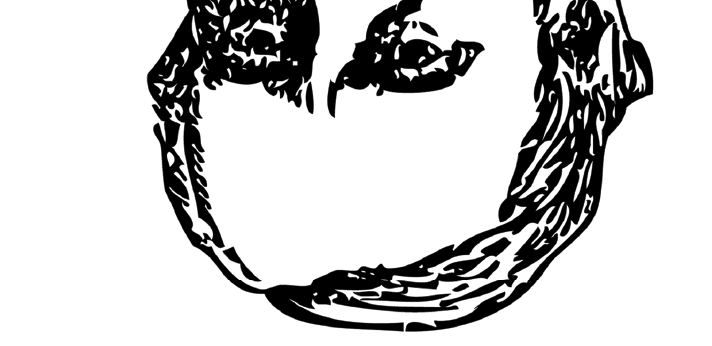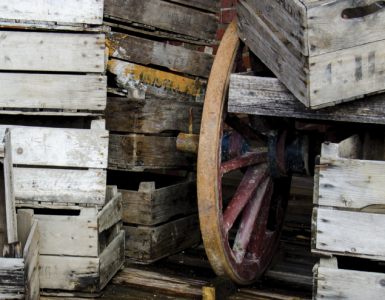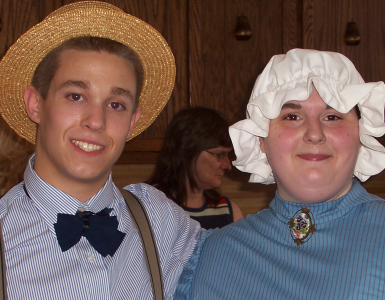by Sherry Chapman
First published in Spring, 2012, Volume 7, Issue 2, The Hatchet: Journal of Lizzie Borden Studies.
The new Bible on Lizzie Borden, Parallel Lives: A Social History of Lizzie A. Borden and Her Fall River (by Michael Martins and Dennis Binette, c 2010, Fall River Historical Society, Fall River, Massachusetts) is truly a masterpiece by accomplished historians. That is why it is surprising that virtually nothing was found on Andrew Borden by probably the most diligent of researchers. Maybe they simply didn’t know where to look.
Not to pretend it was easy to find anything beyond what has been already known about him, I was a girl on a mission. (If Emma and Lizzie can be called “girls” anyone can.) I spent innumerable hours that turned into days that were easier to count including, but not limited to, libraries, courthouse documents, and entire newspapers on microfilm. Now there’s an activity for the Church of the Latter Day Saints—to make an alphabetized index of the old newspapers at the Fall River Library. Still I had paltry finds; enough to submit to Mondo Lizzie perhaps.
I quit. I was spending too much time on this, getting motion sickness from the microfilm images as I scrolled them and probably burning my corneas from staring at that small, old fashioned print.
Sometimes when you quit something and take a breather, relieved that that part of your life is over, things happen. My happening occurred in a restaurant. (I would say the name of it but frankly their service was sub par.)
Hungrily into my salad, I was suddenly patted on the shoulder. I thought a fellow patron was trying to give me the Heimlich maneuver so I said, “I’m not choking!” When I talked with my mouth full, a chunk of ham went down my throat. The kind stranger in back of me said, “Well that’s good!” As I tried to get through to him that I was now indeed unable to breathe, the Good Samaritan whacked me on the back. “How the heck are ya?” too loudly and too close to my ear. I would have elbowed this troublemaker but his whack made the ham go down. Turning, there stood my good friend of some years, Jules Ryckebusch. Exchanging a quick hug, I motioned to one of the empty chairs and he sat down.
“It’s been ages!” he said with his usual exuberance.
“Too long.” I smiled. When you are with Jules Ryckebusch, you cannot help but feel his warmth and that kind, kind face. I asked him what brought him out during the daytime hours (for some reason I had only seen him at night), and he joked about being a vampire, which wasn’t all that funny but I really like this man. And I was also about two bucks short of my lunch bill. I laughed a little longer than I normally would.
One thing I like about Jules is he is constant in his habits for the most part. His conversation is enthralling and fun. You never know what he’s going to say. But his mannerisms, his basic dress, even his after shave has never changed.
I doled out my usual jokes about it (I did every time we met, and I think he had come to expect it). But this time I asked the name of it.
“Oh! Um … um … Ah! It’s called ‘Andrew’.”
“Why do you seem to be wearing it every time I see you? Did somebody give you a case of it one Christmas?”
He shrugged. “It’s still the one bottle I’ve had since the hundredth anniversary of the Borden murders,” which was about 20 years ago. “I don’t get out much.”
It wasn’t long before conversation turned to my quest for something on Andrew Borden. “There just isn’t anything out there,” I semi-whined. “It’s like unreal. How can someone live a pretty public life for 70 years and the only thing we know about him is he wore black and kept a baseball bat under his bed.”
“Really?” Jules asked.
“You’re kidding. You didn’t know? I thought you were the Granddaddy of this Liz Biz.”
“Well, there are a few things I forget after a while. But not that many. I have some things in a file at my house on Andrew Borden. I don’t want to say who gave them to me, but you’re welcome to peruse them. If you searched that thoroughly, though, you might already have the same info.”
I had to confess. “I did skip the Q and X files in Taunton. I was tired…”
“I’ll pay my bill and meet you at my house?” and he was up and off on his long legs before I could answer—or ask him for the two dollars I was short on.
He had two file folders to hand me. “Don’t get too excited,” he said. “A lot of it is correspondence that goes with the good stuff.” He offered me a cup of tea I said ‘yes’ to, as he left the room and left me with the files. I didn’t know when he came back, when the tea kettle went off, or if he brought me any, I was that absorbed in the papers. Every now and then I caught a glimpse of him in his chair, watching me, smiling at my enthusiasm.
I hated to, but I had to. “Jules, do you have some paper I can write on?”
“Of course.” As he rose to get it I thought I might as well get the other embarrassment out of the way. “And maybe a pen?”
He laughed. “ Marlie. Always the writer without a pen. Don’t ever change.”
He furnished me with a new legal pad and a pen that was too nice. I don’t mean to be, but I am a pen stealer from way back. I made a mental note to be sure I didn’t take this one.
Apparently Andrew Borden was not a very handsome child and got little attention from home or school. A theory was that it led Andrew to gravitate more toward things instead of people. As a small child, he often could be seen by the hearth making little dollar bills out of paper and colored wax, the precursor to crayons. It was harmless enough, until he tried to spend some at a store. Luckily, he was so young and the clerk laughed him back out the door.
Andrew showed a propensity toward keeping things. I suppose today he would be called a “hoarder.” But since his father sold trash for a time, there was little for him to collect. So he got a small box and collected the mouse droppings that were constants in their Ferry Street home. He was moved to tears when they were found and thrown away. Andrew commented years later to John Morse (his brother-in-law from his first marriage) that it was the only time he can ever remember crying.
The family ate a lot of fish—the fish that his father (later a fish peddler) could not sell. By then it was past its expiration date, if they had one back then. From this, it is assumed that Andrew developed his cast iron stomach that allowed him to eat leftover leftovers as long as it took to finish them. However, the only fish he cared for in his adult life was swordfish, one of the fish his father never sold.
It cannot be agreed upon when he acquired a phobia, but it is known that he had an unexplained fear of axes. He never used one, even when he did away with a flock of pigeons in his barn in his later life.
As an adolescent, Andrew Borden was low keyed, compared to most others. One thing about him that does survive is that after he moved out, he used to joke that Ferry Street was where all of the homosexuals in Fall River lived. It is not known if Andrew was actually against this population, or if he simply thought it was a funny joke. He was an undertaker. Who can figure undertakers?
Evidence has been found that Andrew did serve in the Civil War. He was in the 91st Fall River, Massachusetts unit under General George C. Browning—alternatively known as “The Bloomer Loomers.” It was said that all of the homosexuals in the Civil War armies were in that group.
While in the Union Army, he did not understand why fellow soldiers called him “Major Tight,” no matter how often he told them he was not a major and his last name was not “tight.”
According to a medical source, Andrew did not wear a truss out of necessity. He used it to conceal money upon his person. He was probably right in thinking chances are no one would look there.
It is entirely possible that he mellowed as he aged. Correspondence shows that Lizzie’s Grand Tour in 1890 was a present from her father for her 30th birthday. Andrew did indeed send his youngest daughter funds during her European trip. Apparently he had little choice, since she wrote him that if he could not send her some money she would not be able to return home. Lizzie’s stepmother, Abby Borden, tried to persuade her husband not to send anything, but in the end Andrew knew he could not face his fellow Fall Riverites had he left “Baby Lizzie” overseas.
Private correspondence also proves that Andrew did not purchase Lizzie’s sealskin cape. Lizzie had taken the garment from a shop in Germany called Dilten Berther. This escapade of hers was not as easy to dismiss by the owner, as clerks at home knew they could collect the price on the tag from her father. The German police were involved, and it was only after they had a check in their hand from Andrew Borden for the cape that they allowed Lizzie to leave the city.
There are sources that say Andrew did not sell his horse about a year before the murders in 1892 but used it to feed his family, unbeknownst to them. The only person who would be able to positively know about this would be Bridget Sullivan and, well, she simply is not available.
A rare news clipping reported that Andrew tried to buy Jay Gould’s yacht by trading pears and eggs. Mr. Gould was incensed. “Mr. Borden. An item of such beauty and wealth cannot be traded for—garbage. It’s obvious you have never seen men working to build a fine yacht.” Borden paused to consider what Gould said. “Well,” he said, stroking his whiskers, “have you ever seen a man laying an egg?” He did not get the yacht.
Yes, the Bordens were strange in their ways, even for Victorian Americans and the many fascinating things they had and did that seem so foreign to us. But what is probably more fascinating is that you have read this article and once again have been Prila ooledfa by Errysha apmancha. Many thanks to Jules Ryckebusch and his magical files. I really do like the man.






